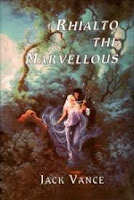When kudos are handed out for Jack Vance’s Dying Earth tales, it’s rare that the three Rhialto stories, collected in Rhialto the Marvellous (1984), are left with anything in their hands. In the context of Vance’s oeuvre and his fandom, the reason is interesting. Introspective, sober (relatively speaking), and of a particular flavor, they possess only a few of the qualities of the other Dying Earth stories, but are deeper, darker, and more substantive for it. Most of Vance’s stories read and appreciated for the fast-paced dynamics of plotting, the Rhialto stories offer something similar but a little different—just different enough to be something special.
The stories in Rhialto the Marvelous all feature a group of eccentric magicians living in the last days of the sun. Vance capitalizing on the concept as only Vance can, their petty and esoteric interests are presented in comedic yet human fashion, and are integral to their interpersonal differences. Creaky, old men having wars of words (and occasionally fists) over magical baubles and tomes is great fun—high flying verbiage contrasted by childish interests.
What better contrast to a group of eccentric magicians than witches? In “The Murthe”, Vance takes to task their patriarchal paradigm by introducing a powerful witch with long-desired revenge. The magicians’ blindness to the broader world Vance’s subtle touch, their handling of the idea of the opposite sex, and the history of witches and magicians on Earth, is his direct touch.
But if ever there were a Dying Earth story that embodied the theme, fighting for the title would be “Fader’s Waft”. While a rivalry between Rhialto and another magician named Hauche-Rochere take center stage, it’s the depths this rivalry is taken which really unpack the concept of Dying Earth. One magician playing a trick on another, it results in a scenario in which knowledge is needed from the Perciplex, a numinous stone which contains the rules by which all magicians live by. But something has happened to the Perciplex, and Rhialto must undertake a fantastical journey to get to the bottom of the situation. This journey covering eons of time, played out across this tapestry of time are slices of human history that are wholly Daoist (i.e. cyclical) in nature. With Vance’s keen eye to humanity, these far-future slices present different but wholly recognizable forms of us, the sum of the cycle being where the final conception lies. The fact this conception is surrounded by so much imagination and magician-ly fun is icing, and cherries, and IOUN baubles.
The other story vying for the title of that which most closely embodies the Dying Earth theme would be the final story in the collection, “Morreion”. Perhaps the most subtle tale Vance has ever told, the idea of the solar system’s downfall is brought to bittersweet life. It tells of Rhialto and the other magicians’ encounter with an archevult, and their subsequent quest to track down the source of its magical baubles. The quest taking the group onto the trail of a magician the world had thought lost to time and legend, they learn he yet still lives. But it is the nature of his existence which has the strongest bearing on the quest, and the subsequent meaning of the story.
In the end, there is nothing like Rhialto the Marvellous in Vance’s oeuvre. (Perhaps moments of the Lyonesse trilogy?) Vance will never be taxonomized as a humanist, but these three stories lend a voice to the argument looking for the possibility. Where the stories in the original The Dying Earth collection feel more fresh and vibrant than their setting would seem to allow for, those in Rhialto wholly belie the concept of the sun/Earth/humanity’s slow but certain demise, and what humanity’s legacy will be in that lens. The fact Vance so successfully juxtaposes his style and panache against this backdrop to positive, often humorous effect makes the collection one of his most under-appreciated best. Now, where are my kudos…


No comments:
Post a Comment